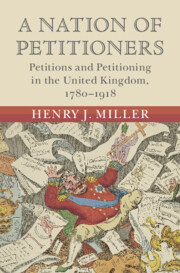Book contents
- A Nation of Petitioners
- Modern British Histories
- A Nation of Petitioners
- Copyright page
- Dedication
- Contents
- Figures
- Tables
- Acknowledgements
- Abbreviations
- Introduction
- Part I Petitions
- Part II Petitioners
- Part III Petitioning
- 7 The Practice of Petitioning
- 8 Mass Petitioning
- 9 Petitioning and Representation
- 10 Petitioning and Political Culture in an Age of Democratisation
- Conclusion
- Select Bibliography
- Index
10 - Petitioning and Political Culture in an Age of Democratisation
from Part III - Petitioning
Published online by Cambridge University Press: 02 February 2023
- A Nation of Petitioners
- Modern British Histories
- A Nation of Petitioners
- Copyright page
- Dedication
- Contents
- Figures
- Tables
- Acknowledgements
- Abbreviations
- Introduction
- Part I Petitions
- Part II Petitioners
- Part III Petitioning
- 7 The Practice of Petitioning
- 8 Mass Petitioning
- 9 Petitioning and Representation
- 10 Petitioning and Political Culture in an Age of Democratisation
- Conclusion
- Select Bibliography
- Index
Summary
Between the late nineteenth century and early twentieth century the context for petitioning changed. The number of public petitions addressed to the House of Commons declined, and commentators and politicians increasingly regarded petitioning as redundant in an era of mass electoral politics ushered in by the Third Reform Act (1884–85). Yet, as this chapter shows, petitioning did not decline but was rather reinvented in this period. Campaigners increasingly addressed singular mass petitions to a range of different authorities, including the monarch and Downing Street, in ways that emphasised the performative presentation of petitions to maximise coverage in the mass media. High-profile examples, such as petitions organised by the militant suffragettes or the Ulster Covenant and Declaration (1912) associated with Unionist opposition to Irish Home Rule, were part of a broader reimagining of petitioning with the UK’s nascent democracy. Finally, contemporaries also considered petitions to be a mechanism for calling referendums, as shown in a number of bills of the time, and also in the numerous mass petitions from Unionists and others to the king calling for Home Rule to be referred to the people via referendum or general election. As this chapter shows, while the practice of petitioning changed during an era of rapid democratisation it retained an important place within UK popular politics and political culture.
Keywords
- Type
- Chapter
- Information
- A Nation of PetitionersPetitions and Petitioning in the United Kingdom, 1780–1918, pp. 253 - 275Publisher: Cambridge University PressPrint publication year: 2023



